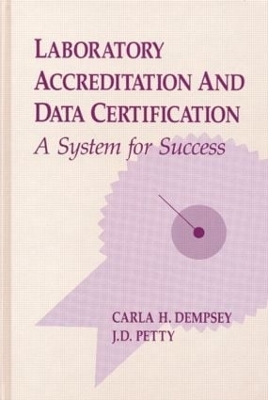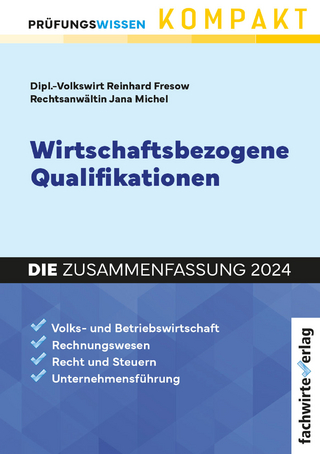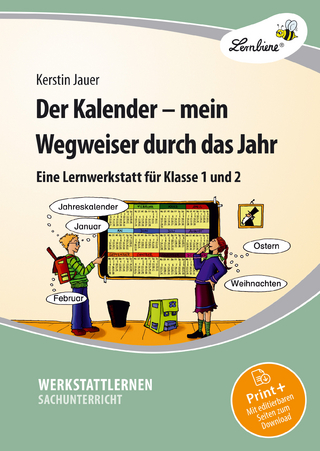
Laboratory Accreditation and Data Certification
Crc Press Inc (Verlag)
978-0-87371-291-0 (ISBN)
Carla Dempsey is a Program Development Manager for Environmental Programs at Lockheed Engineering and Sciences Company in Washington D.C. She is responsible for locating opportunities in the environmental field for applying the high technology that has been developed at Lockheed. Ms. Dempsey has prior experience at the Environmental Protection Agency where she was the Quality Assurance Coordinator for the Superfund Contract Laboratory Program. She has also been a Project Manager with environmental consulting firms. Before focusing on environmental issues, she assisted the U.S. Navy design a national quality assurance program as the Quality Assurance Manager for the Laboratory Division at Puget Sound Naval Shipyard in Bremerton, WA. Ms. Dempsey received her BS. in Chemistry from Gonzaga University in Spokane, WA and her MS in Chemistry from the University of Washington in Seattle. J. D. Petty is the Director of Analytical Research and Quality Control at the Ferment a Animal Health Co. The research involves development of methodology to determine a wide array of pharmaceutical ingredients in a variety of matrices. In addition Dr. Petty is responsible for ensuring that all analytical data meet the requirements of FDA Good Laboratory Practice and Good Manufacturing Practice regulations. Dr. Petty has prior experience as the Chief of the Quality Assurance Research Branch of the EPA's Environimal Monitoring Systems Laboratory at Las Vegas and as the Chief Chemist of the U.S. Fish and Wildlife Services' National Fisheries Contaminant Research Center located in Columbia, Missouri. Dr. Petty received his BS in Chemistry from Central Missouri State University in 1970 and his Ph.D. in Organic Chemistry from the University of Missouri-Columbia in 1975. Dr. Petty has authored and coauthored over 50 publications on a wide range of research topics.
I. Laboratory Accreditation and Certification - Historical Perspective and Definition of Need -- Definition of Need -- The Goals of Laboratory Accreditation / Certification -- Process Inspection Versus Product Inspection -- Evolution and Description of the Current Programs -- The Role of the Government in Accreditation and Evaluation -- The Role of Professional and Trade Organizations -- The Role of the Laboratory Industry -- The Role of Private Certification Companies -- Statement of the Problem: Current Programs Do Not Effectively Meet the Goals -- The Solution - an Introduction -- II. Certification, Accreditation, Registration and Listing -- Definition of Terms -- Use of the Terms Accreditation and Certification -- Current Use of Related Terms -- Public Perception and Confidence of Programs and Terms -- III. Principles of Laboratory Accreditation -- Description -- Strengths and Weaknesses -- Public Perception and Confidence and Scientific Validity -- Cost and Benefits -- Effectiveness and Integrity -- IV. Principles of Product Certification - As Related to Laboratory Accreditation -- Description -- Third-Party Product Certification Programs -- Listing Programs -- Strengths and Weaknesses -- Public Perception and Confidence and Scientific Validity -- Cost and Benefits -- Effectiveness and Integrity -- Description of Current "Certification" Programs -- Description of Current "Listing" Programs -- Critique - Do the Current Programs Meet Product -- Certification Requirements? -- Product Certification and Data Inspection - The Critical Link -- V. The Environmental Protection Agency Contract Laboratory Program - A De Facto Certification Program that Includes Principles of Each System -- Introduction -- Pre-award Elements -- Post-award Elements -- CLP Strengths and Weaknesses -- Successful Application of the CLP -- Public Perception and Confidence and Scientific Validity -- Cost and Benefits -- Effectiveness and Integrity -- VI. The Total Quality Management Approach -- Description -- Understanding Total Quality Management - Deming's Fourteen Points -- Total Quality Management and Its Relation to Accreditation and Certification Systems -- The Purpose of Certification and Accreditation in Relation to Vendors and Purchasers -- Vendor Accreditation and Vendor Certification - Are These Systems Needed? -- Improvement of the Current Programs through Application of Total Quality Management Principles -- VII. The Solution - A System for Independent Third-Party Certification of Analytical Data -- Description -- Appraisal of Process Capability -- Appraisal of the Ability of the Laboratory to Perform -- Specifications and Requirements of the System -- The Role of Accreditation and Certification Bodies and the Role of Data Purchasers -- Third-Party Certification Authorities -- Oversight of Third-Party Organizations -- VIII. Implementation Considerations -- Introduction -- Roadblocks to Implementation of a National Program -- Reluctance of the Federal Government -- Reluctance of Laboratories to Accept a National Program -- The General Approach - A Schematic Design -- Accreditation and Certification Criteria -- Tiered Approach to Defining Requirements -- The Future System - Quality Assurance or Chaos? -- New Requirements -- Old Requirements - Redesigned -- Responsibility for Development of Quality Specifications and Requirements -- Responsibility for System Logistics -- Distribution of Accreditation and Certification Information -- Appeals, Arbitrations, and Liability -- The Importance of Education -- Cost and Benefits -- Additional Hurdles to Implementation -- IX. Performance Evaluation Materials - A Vital Element of the System -- Introduction -- Definition of Terms -- Current Use of Blind Samples in Laboratory Evaluation Programs -- Real Matrix Samples Versus Synthetic Samples - Are Both Types Valid? -- Internal Versus External QC Samples -- The Use of Performance Evaluation Materials by Industry -- The Optimal Solution - Use of Performance Evaluation Materials by Both Accreditation Programs and Data Purchasers -- Use of Performance Evaluation Samples Versus Split Samples -- Use of Performance Evaluation Materials to Assist in Data Review and Assessment -- Performance Evaluation Materials Suppliers -- Cost of Performance Evaluation Samples -- Use of Performance Evaluation Materials in the ProposedAccreditation and Certification Program -- X. Application of this System to Non-Environmental Laboratories -- Comparison of the Mission of Non-Environmental Testing Laboratories to Environmental Testing Laboratories -- Key Elements of the System that Apply to All Laboratory Types -- Applicability of the Concept -- XI. The Impact of National Laboratory Accreditation on Internal Quality Assurance and Control -- Internal Laboratory Quality Assurance - Research and Development QA Versus Contract Chemistry QA -- Elements of a Formal Internal Quality Assurance Program -- Internal Quality Assurance - Why It Is Needed? -- Internal QA - More Critical Than Ever Before -- XII. The Role of Industry in Laboratory Accreditation and Data Certification -- Introduction -- Industry's Role -- Criteria for Data Purchase -- Cost of Poor Data to Industry -- Industry's Responsibility -- Tools to Assist Industry in Meeting Their Responsibility -- Future Responsibilities for Industry -- XIII. Summary of the Problem and the Solution -- Restatement of the Problem -- The Problem - Stated in a Slightly Different Way -- Synopsis of the Solution -- Potential Future Application of the Solution -- Limited Recommendations -- XIV. The Future in the 90's -- Introduction -- The CLP - Is it a Good Model - Or A Failure? -- Projections for the Future for Environmental Data -- Final Hope for the Future -- Index.
| Erscheint lt. Verlag | 3.6.1991 |
|---|---|
| Verlagsort | Bosa Roca |
| Sprache | englisch |
| Maße | 156 x 234 mm |
| Gewicht | 512 g |
| Einbandart | gebunden |
| Themenwelt | Schulbuch / Wörterbuch ► Unterrichtsvorbereitung ► Unterrichts-Handreichungen |
| Naturwissenschaften ► Chemie | |
| Sozialwissenschaften ► Pädagogik | |
| ISBN-10 | 0-87371-291-9 / 0873712919 |
| ISBN-13 | 978-0-87371-291-0 / 9780873712910 |
| Zustand | Neuware |
| Haben Sie eine Frage zum Produkt? |
aus dem Bereich


